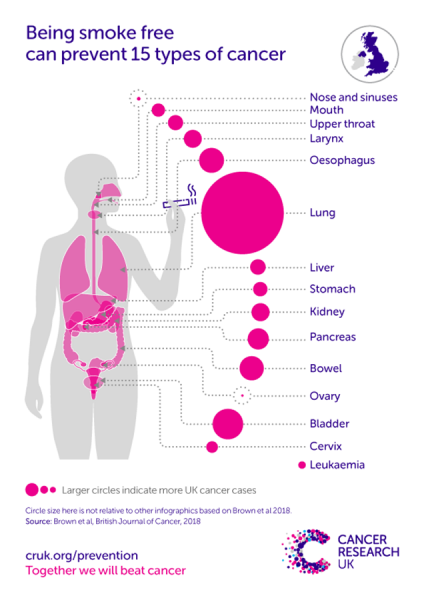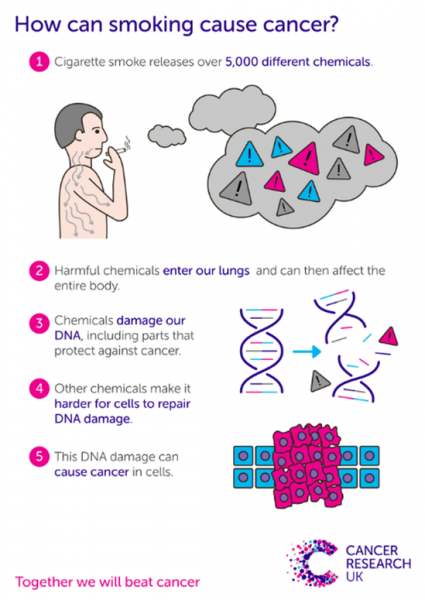Smoking causes 16 different types of cancer.
You might know smoking causes lung cancer, but it also causes cancers of the mouth, nasal cavaties, pharynx and larynx, stomach, kidney, bowel, liver, pancreas, ureter, oesophagus, cervix, bladder and ovaries as well as causing leukemia.
Smoking causes more than 1 in 4 cancer deaths in the UK.

How smoking causes cancer
Our bodies and lungs are not designed to cope with the amount of harmful chemicals in tobacco smoke. These are inhaled into our lungs and reach every organ of our body.
Cigarette smoke damages DNA and makes it harder for cells to repair any DNA damage. They also damage the parts of DNA that protect us from cancer. The more years you have smoked and the more cigarettes you smoke a day, the higher your risk of cancer. But remember, the sooner you stop, the lower your risk of cancer. Everyone who smokes can benefit from stopping, and it’s never too late to stop- even if you’ve smoked for years.
Visit our Ways to Quit page for local support and advice on quitting aids which can help you stop and make quitting less stressful.
Source: image from Cancer Research UK

Poisons in tobacco
When you smoke you breathe in thousands of toxic chemicals, whether you smoke cigarettes or roll ups. Dozens of these chemicals are known to cause cancer like:
- Arsenic – a poison
- Benzene – an industrial solvent refined from crude oil
- Polonium 210 – a highly radioactive element
These enter your lungs and spread through your body. Smoking is the leading cause of lung cancer causing around 7 out of 10 cases.
Some of these poisons are given off due to lighting the cigarette, some are naturally in tobacco.
Source: Image from Cancer Research UK

Quitting smoking can reverse the damage caused by smoking
Often, people who have smoked for many years believe that “there’s no point in quitting because the damage has been done”.
However, a study, published in the journal Nature, gives new hope to people who want to quit.
It found that the health benefits of stopping smoking begin immediately and grow over time. Even in the lungs of people who used to smoke damaged cells were replaced by healthy cells, similar to those found in people who have never smoked. The cells in the lungs of ex-smokers were also found to be nearly four times healthier than the cells of those who still smoked.

